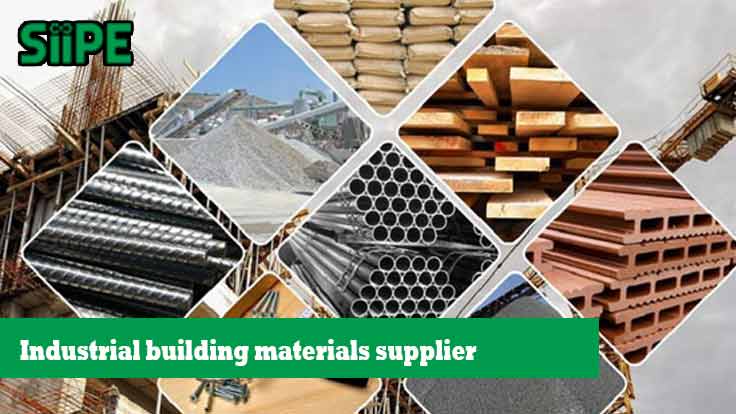In the realm of construction, industrial building materials suppliers play a pivotal role in shaping the infrastructure that supports modern life. These suppliers are at the forefront of delivering essential materials required for building everything from small residential homes to massive industrial complexes.
Their expertise, supply chain management, and ability to provide high-quality materials directly impact the success of construction projects across various sectors.
Understanding Industrial Building Materials
Industrial building materials encompass a broad range of products used in construction. These materials are categorized into structural components, finishing materials, and specialty products. Common examples include:
- Structural Materials: Steel, concrete, wood, and masonry products used for building frames, walls, and foundations.
- Finishing Materials: Paints, tiles, flooring, and other products that add aesthetic value and functionality to structures.
- Specialty Materials: Insulation, adhesives, sealants, and fire-resistant materials designed for specific applications.
Each category plays a unique role in ensuring the durability, safety, and sustainability of construction projects.
The Role of Industrial Building Materials Suppliers
Industrial building materials suppliers act as the backbone of the construction industry. Their contributions extend beyond merely providing materials; they also offer expertise, logistics support, and quality assurance. Here are some key roles they play:
1. Sourcing High-Quality Materials
Suppliers are responsible for sourcing materials from reliable manufacturers. This involves evaluating products for quality, compliance with industry standards, and suitability for specific applications. By partnering with reputable producers, suppliers ensure that construction projects meet required specifications.
2. Streamlining Supply Chains
Managing a seamless supply chain is critical in construction. Suppliers coordinate the procurement, storage, and delivery of materials to ensure that construction timelines are met. Efficient logistics reduce delays, minimize costs, and improve overall project efficiency.
3. Providing Technical Expertise
Industrial building materials suppliers often have in-depth knowledge of the products they provide. They assist contractors and builders in selecting the right materials for specific applications, considering factors such as durability, environmental impact, and cost.
4. Ensuring Regulatory Compliance
The construction industry is heavily regulated to ensure safety and sustainability. Suppliers play a crucial role in providing materials that comply with local and international building codes, environmental regulations, and safety standards.
5. Supporting Sustainability
As sustainability becomes a priority in construction, suppliers are adopting eco-friendly practices and promoting the use of green materials. Recycled steel, low-VOC paints, and energy-efficient insulation are examples of materials that contribute to sustainable building practices.
Challenges Faced by Industrial Building Materials Suppliers
Despite their critical role, suppliers face numerous challenges that impact their operations:
- Supply Chain Disruptions: Global events, such as pandemics or geopolitical conflicts, can disrupt supply chains, causing delays and increased costs.
- Fluctuating Material Costs: Prices of raw materials like steel, cement, and timber are subject to market volatility, which can affect project budgets.
- Sustainability Pressure: Suppliers must adapt to increasing demands for sustainable and eco-friendly materials, which often require significant investment in research and development.
- Technological Advancements: Keeping up with innovations in construction materials and methods demands continuous learning and adaptation.
Innovations in the Industry
The industrial building materials sector is experiencing rapid technological advancements that are transforming the way suppliers operate. Some notable innovations include:
1. Smart Materials
Smart materials, such as self-healing concrete and phase-changing materials, are becoming increasingly popular. These materials enhance building performance and reduce maintenance costs.
2. Digital Supply Chain Management
Suppliers are leveraging digital tools and platforms to optimize supply chain operations. Real-time tracking, automated inventory management, and predictive analytics improve efficiency and reduce waste.
3. Sustainable Solutions
Eco-friendly materials, such as cross-laminated timber (CLT) and recycled aggregates, are gaining traction in the construction industry. Suppliers are playing a key role in promoting these solutions.
4. 3D Printing
The use of 3D printing technology in construction is revolutionizing material usage. Suppliers are adapting to this trend by offering materials specifically designed for 3D printing applications.
The Future of Industrial Building Materials Suppliers
The future of industrial building materials suppliers lies in their ability to adapt to changing industry demands and embrace innovation. Here are some trends shaping the future:
- Increased Focus on Sustainability: The demand for sustainable construction materials will continue to grow, driven by regulatory requirements and consumer preferences.
- Integration of Technology: Advanced technologies, such as artificial intelligence (AI) and blockchain, will streamline supply chain management and enhance transparency.
- Global Collaboration: Suppliers will increasingly collaborate across borders to meet the needs of multinational construction projects.
- Customization: Tailored solutions, such as prefabricated materials and modular construction components, will become more prevalent.











